|
What did geeks do before personal computers and the internet were widespread?
I can tell you because I was one of those people. Maybe born too early, I suppose. I dearly wish there'd been PCs and an internet when I was in high school. Their presence might have saved me from all sorts of agonies and mistakes. And especially the seemingly unrelenting boredom, broken only by brief moments of terror and outright torture...
|
But there weren't any PCs or internet. So what did I do with my time? Read lots of science fiction. Some fantasy too (notably Lord of the Rings), but mostly pure sci fi. I often secretly did without lunch in high school so I could spend the money on books instead.
I played chess as well. But drowning in the throes of teenage hormonal surges like everyone else around me I mostly fell in love with this sweet, beautiful girl who sat in front of me in one of my classes.
It never worked out of course. A bit later I learned she was a cheerleader (agh! How cliche is that?). Before falling for her I'd been pretty much unaware the school even had cheerleaders.
|
|
|
Some geeks inadvertently become adventurers and outlaws
My ultimately frustrated quest to win her heart led me into all sorts of other adventures though. My unrequited love for her actually helped me make a friend-for-life at the time. For he too was madly in love with a girl who didn't love him back, and misery loves company as they say. That was the first and perhaps only thing my friend and I ever had in common. But after that we were more or less permanent buddies. Despite never getting those particular girls. We soon sought out adventures of other sorts to kill the pain. And wow, what adventures we had. Many which could qualify for the events in a young Indiana Jones tale. Heck, for a while I considered my friend to be a real life Indiana Jones! Ha, ha.
Hmm. Now that I think about it that cheerleader had lots of powerful and lasting effects on my life, despite never really being in it herself. Besides indirectly causing me to make a new life-long best friend who'd himself have a huge impact on me, she had a lot to do with the very first car I bought and what I did with it too. Namely, the Shadowfast I write about elsewhere on-site. You see, the cheerleader's first boyfriend I ever became aware of owned a black 1969 Mustang Mach One. So when I found Shadowfast about that same time I had to have him (we're back to teen cliches again). And since the cheerleader was ever out of my reach I had to do something to pass the time. So I went on adventures with my real life Indiana Jones buddy while also designing and building my supercar.
But there's more to her contribution here. For her father was a state trooper. I kid you not.

Above is an artistic rendition of Shadowfast in his prime.
The cheerleader's dad being a trooper didn't create my personal desire for rebelling against authority back then. But maybe it helped personify it a little for me. Along with the desire to prove Shadowfast's prowess too.
So the cheerleader unknowingly created a whole other category of adventures for me there, in my outlaw driving days.
Some geeks will transform lemons into power sources
And now she's helped inspire an entire book! Ha, ha. Egads, but am I obsessed? Unfortunately (or fortunately?), no. Thirty years plus is a long long time. But still those early events which helped shape me remain today among my most unforgettable. And so the easiest to exploit for motivation in the surprisingly tough work of writing a novel. Something I guess would be true for many writers. I've heard that first novels are often somewhat autobiographical. In my own case that seems to be so.
Many geeks endure a long gauntlet of unremitting violence
But the cheerleader isn't my only strong memory from high school. There was also much violence. So much in fact I was astonished by the huge drop in the violence I encountered once I graduated and lived for a while outside that environment. I just couldn't believe most adults managed to go for weeks and months without engaging in physical combat of some sort. It seemed unnatural.
Of course it was wonderful not to be nursing injuries on a regular basis!
Between pining away for the cheerleader and being embroiled in fist-fights on a regular basis in high school, my grades suffered tremendously. So I kind of lost some geek stature score-wise. But it seemed unavoidable. For I refused to be intimidated. I didn't care how big the guy was (or how many). Heck, I sometimes even came to the rescue of others under such duress. Despite being a fighter mainly in spirit rather than body. I was small, scrawny, and for a long time handicapped by my raising to be gentle towards others because I was the oldest of six kids, and my parents about as peaceable and forgiving as anyone of that era could be. For a long time I had this mental block against hurting anyone-- even someone who was hurting me. But after you get pounded enough you'll finally overcome such things-- or else cease to exist.
The true source of this page is 
Maybe my biggest disadvantage was my poor vision. To drag in yet another geek cliche, I was blind as a bat without my eyeglasses. And of course in most fights the glasses were knocked off immediately, giving my opponents an enormous edge.
The flip-side to the eyeglasses thing? Jeopardy-game-show-champion-level trivia knowledge. Gleaned from reading as much of an entire set of Worldbook Encyclopedias as I could stand somewhere around the third and fourth grades. My own home set. With a Childcraft set of books too. This home library and a banana seat five speed bicycle I considered to be the best presents I ever got as a kid. Of course I also devoured everything I could find in the elementary school library.
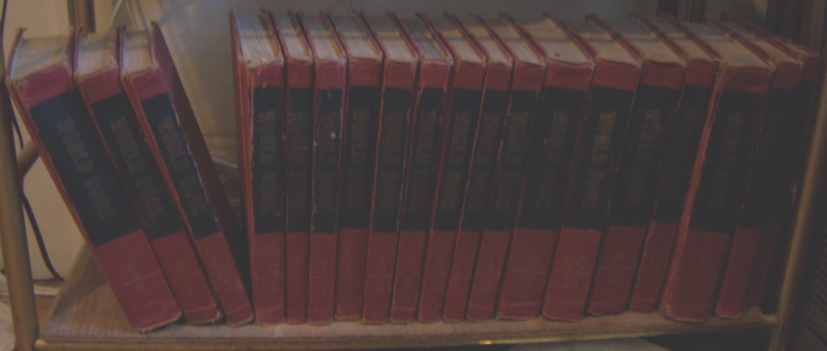
That original Encyclopedia set still exists today-- but is pretty ragged around the edges.
This vast trivia knowledge (for a kid) helped me do well in lots of tests for years afterwards, plus empowered me enormously for debates and conversations with just about anyone on any subject, for decades to come. In a much later corporate environment this would enable me to act as a sort of vertical integrator for the whole company, trouble-shooting operational problems via suprisingly robust and profound dialogues with company staff at all levels from the very top to the very bottom.
But none of that mattered in high school. All that mattered was that intensive reading seemed to leave me extremely near-sighted afterwards, and thus more vulnerable to the violence of my high school years.
It was hard to concentrate on learning in school when you had to plan your every move before and after class in order to keep your potential fights and opponents down to a manageable number for the day. I had a great Algebra II teacher. I'm sure she did her darnedest to educate me. But there was nothing she could do about the major distraction the violence represented for many of us before and after class.
Heck-- she probably worried for her own safety at least a few times during those years. For teachers too could get hurt at my school.
If she's still living, she'd probably appreciate knowing that eventually I taught myself everything she tried to give me and more, in preparation for college. And she was part of my inspiration for the task.
a - j m o o n e y h a m . c o m - o r i g i n a l
Some geeks will grow stronger in the face of adversity
Though I could be terribly shy around girls, in other ways I felt like I possessed an 'indomitable spirit' as some old books might call it. So I actually considered myself above the daily fray, and better than all those who spent their days bullying or intimidating others. This basically resulted in me getting beat to a pulp many times, as I wouldn't subordinate myself to any gang or bully. So many of my injuries could probably have been avoided. But I simply would not cow tow to anyone for reasons I considered illegitimate or undeserved. I didn't care what the odds were.
I guess this strength of will and conviction came partly from all the reading I did of heroic figures in literature. I was determined to be what I thought I should be, and not what others would force upon me.
Yeah, maybe that'll sound silly and impractical to some folks. But I bet it won't to many of the geeks and ex-geeks out there.
Perhaps my grandest high school moment in this regard came when I was challenged to a public fight on school grounds after hours by this guy who constantly harassed me in both a drafting class and algebra (or was it geometry?) class. Naturally he was considerably bigger and stronger than I. He despised the fact I wouldn't follow orders and simply allow him to punch and kick me without reprisal day in and day out. I did my best to give as good as I got. So finally one day in algebra he told me to meet him after school to have it out and I said OK. There were plenty of witnesses. Many high schoolers love to watch fights.
I made certain to show up where and when we'd agreed upon. Sure, I was scared. But there seemed no choice to me. Plus, you've got to remember I was a veteran of many battles by that time. Not a victor, but a veteran.
I wasn't alone. Quite a few other kids had shown up to see me get beaten. Word had gotten around. Sure, there were likely going to be more interesting fights going on at the same time elsewhere on the grounds. But you tended to get the crowd who knew at least one if not both the combatants personally.
So we all waited. And waited. And waited. I finally turned to the crowd and said "Well, it doesn't look like he's coming, does it?" They agreed, and we all dispersed.
So why hadn't he shown up? Because he was positive I wouldn't. He figured it was a waste of time, and so hadn't even come by to check if I was there.
That wouldn't be the only time an opponent would underestimate me, or my resolve.
He was chagrined to discover the next day his personal reputation had taken a tremendous hit by virtue of the word of mouth spreading from all the witnesses to the debacle. And my own stock had gone up. If my memory serves me we got along considerably better after that. Indeed, he even seemed to be cowed a bit himself by events. If he ever came near to calling me out again, he stopped himself short in the act. I'm sure I would have gone through the entire exercise again if necessary. And I believe I made that clear to him.
My first couple high school years were the worst, violence-wise. My senior year the best. But still not entirely free of violence, or the threat of same. Of course the improvements may have stemmed mainly from me getting better at defending myself. They definitely didn't come from me getting much bigger or stronger physically.
I'm not saying I became a champion fighter by any means. Rather, I just managed to make fisticuffs involving me too costly to be worthwhile for most. Of course there'll always be idiots who don't consider cost-reward ratios...
I believe my high school went through several different principals while I was there, as authorities struggled to get a handle on events.
The violence of my home region apparently became known nationwide by the late seventies-- at least along the ex-convict crowd. Because my best friend and I found ourselves living and working a thousand miles away from home by that time, hob-nobbing with a rough crowd indeed: folks with prison pasts. We got along pretty well with them. But one day they discovered where we were from and went pale. I'm not kidding. After that they were scared of us. And gradually eased themselves out of our company entirely. I personally thought this pretty funny and strange at the time. I don't think they ever explained to us exactly what they'd heard or seen to make them react that way-- and we didn't push it, as naturally we liked the new mystique and 'dangerous' credibility this gave us with that sort of crowd.
All I can figure is that they'd heard of some of our local massacres (one of my brothers barely missed being present at one; a high school English class mate of mine died in another). Or maybe they'd met up close and personal with one of our old classmates themselves in prison.
In hindsight I realize such fear made it much more likely my friend and I might get accidentally shot or stabbed by one of those guys. Yikes! I guess we lucked out.
Many geeks may find themselves not maturing socially until college or later (Agh!)
One humorous aspect to the novel is the warning "Caution: This story incorporates adult language, behavior, and concerns". It's funny because in the story the college student is obviously pretty immature and socially underdeveloped. Pretty much exactly how I myself was in college. So the story is much like a 'coming of age' tale for young men. Or young geeky men, maybe.
The good news for young geeks here is that many of you will get a little better at socializing in your post-college years. The bad news is the same. :-O
a - j m o o n e y h a m . c o m - o r i g i n a l
Some geeks go into (risky) business for themselves
The fierce independence I developed under the pressures of high school and beyond eventually led me into experimenting with self-employment of various sorts. Some of these ventures themselves could be quite exciting at times. Just one example was me one day standing in my shop with a loaded pistol in my jacket pocket aimed at an accomplished martial artist who was trying out some exotic weapons I was selling. Specifically, nunchucks (and maybe some others too. But the nunchucks are what I remember most clearly). Being accustomed to dealing with such people I naturally kept a handgun close by. Fortunately he didn't attempt to do anything more than intimidate me (maybe he was after a discount: if so, he didn't get it). Another example was folks obviously attempting to ambush me in certain places. I.e., in a different business I bought and sold collectibles of a particular variety. Often for cash, for reasons which seemed good at the time. But I soon left that biz due to what appeared to be mounting personal risks. Like discovering one meeting spot essentially set up to be a killing zone. Well, maybe I wouldn't have been killed. But I wouldn't have wanted to test the scenario. I actually still owned Shadowfast at the time, and drove to the meeting in him. But I got suspicious the nearer I got to the place and stopped short. Left my car in a hidden spot and on foot approached the meeting place from a direction different from the road (it was a rural area). And saw some imminent harm awaiting me there. Yeah, I was armed. But heck, nobody in their right mind welcomes a shoot out. I got out of that business soon after.
Above are pics of some of the exotic weapons I sold back then. Knives were immensely popular in my rural area. Especially unusual types. For one thing, some men collected them. Martial arts tools were mainly the province of the younger generation.
It just occurred to me that readers might think it odd I didn't call the police about the ambush folks. But honestly, the thought never entered my mind until just now, as I wrote about the incident. I lived in a different world back then, and pretty much took care of matters on my own. I and many others of my circle simply regarded the police as more of an annoyance than a help. Our attitude wasn't entirely arbitrary; personal experience in large part was what led us to that view. Some hints of such real-life personal experiences are provided in The Shadowfast supercar driver logs.
Another time someone was taking me through some woods (on foot) to show me some land which was for sale. This was in a pretty remote area. I can't recall specifically if I was armed, but surely I was. We suddenly broke into a clearing to discover ourselves smack in the middle of a vast marijuana growing operation. I considered this very very bad news. One, the farmers were there too, harvesting. Yikes! Two, for all I knew there could have been law enforcement officers surrounding the place, ready to pounce. Three, a very unpredictable shoot out might break out any second, whether there were cops there or not. Four, even if I survived whatever happened, if I was arrested in a wholesale roundup there was no telling how long it'd take to extricate myself, despite my innocence. And five, any cops would almost certainly confiscate my gun, probably for keeps. In those days decent guns were pretty expensive and I hated the idea of losing one to police confiscation or thieves in general.
Luckily there was no police cordon around the place. Also luckily, the farmers were friendly. Apparently my guide was known to them. But I was pretty antsy to exit the scene as soon as I could do so without raising the ire of those around me. Did I end up buying the land? No way!
So I tried my hand at other endeavors. But sometimes even things you'd expect to be safe prove otherwise. And vice versa.
Eventually of course personal computers came along: some fifteen years or so before the internet. Unfortunately almost no one could afford the first few generations of the machines. So in college I was mostly stuck with mainframes and terminals for a while.
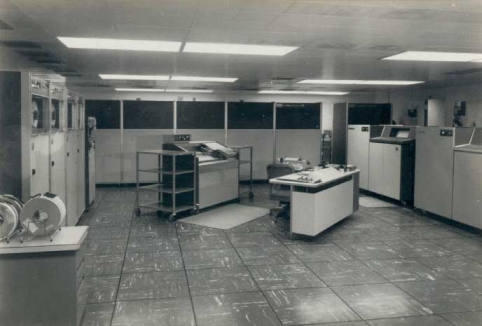
In my first stint at Tech the college used a Burroughs mainframe I believe, with the main hardware inaccessible to students, but via submitted stacks of punch cards and remote dumb terminals. The hidden hardware looked something like the above (students could peer through windows at it).
|
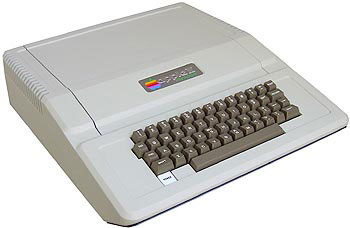
In a later college stint I spent some time on Apple II personal computers.
|
I jumped onto personal computers as soon as I could afford it.
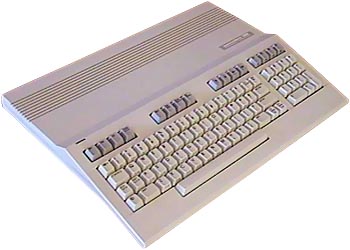
A C-128 was the first personal computer I actually owned. I believe I bought it from my little brother after he moved to a newer Atari 520ST with Mac-like capabilities. My mother had originally bought the more or less complete C-128 system for my brother a few years before, for around $1000-$1500 I believe.
|
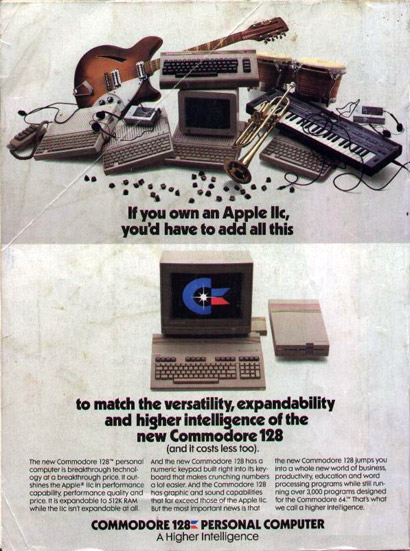
There was a lot of truth in this ad.
|
I became a proto-desktop publisher before the genre was a recognized industry niche by printing and selling my own expensive how-to manual for artist entrepreneurs. This was a 'print-on-demand' operation: I only printed, collated, and shipped manuals as I got orders for them. The Commodore 64 side of my C-128, dot matrix printer(s), and ribbon re-inkers were some of my major tools.
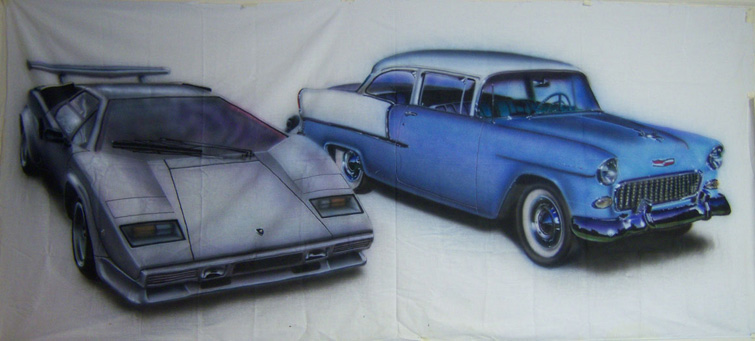
Above is a large banner of a Lamborghini Countach and 1955 Chevrolet I airbrushed during one self-employment stint (the painting is on a cloth sheet). The how-to manual I self-published covered airbrushing.
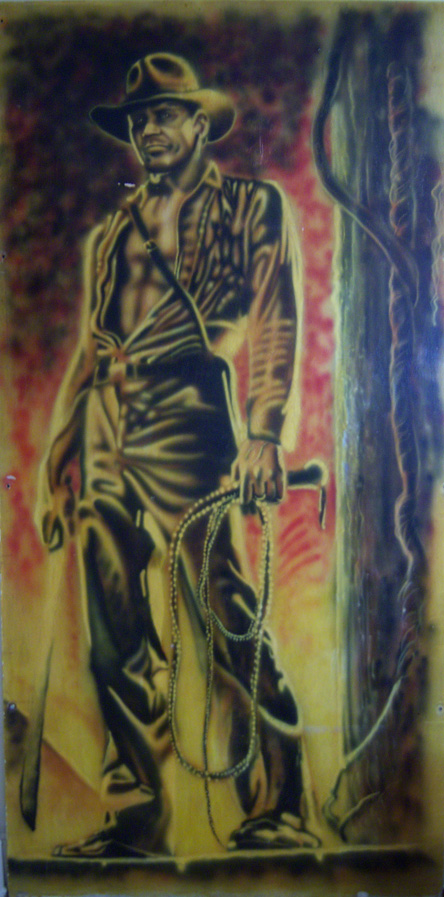
|
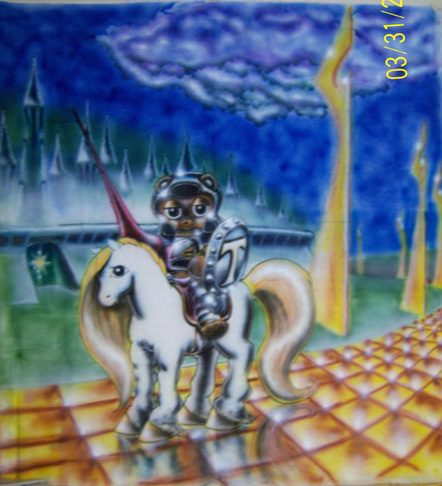
Above is a teddy bear knight fantasy image poster I created to help market my airbrushing skills in a tourist trap town near my hometown.
To left is an eight foot tall airbrushed blow up I did of a cassette tape box graphic for the sound track to an Indiana Jones film. This image was sprayed onto an eight foot by four foot by half-inch thick treated-for-water-resistance plywood sheet. Several coats of varnish or other protective film were applied over the paint. The sheet was then attached with large nuts and bolts to four by four inch posts behind it, resulting in this large sign sitting erect above my airbrush shop, visible from perhaps a quarter-mile away. The sign is scratched up and maybe faded or yellowed now, decades later. But at the time it handily survived some fierce Tennessee mountain summer windstorms with no problem.
|
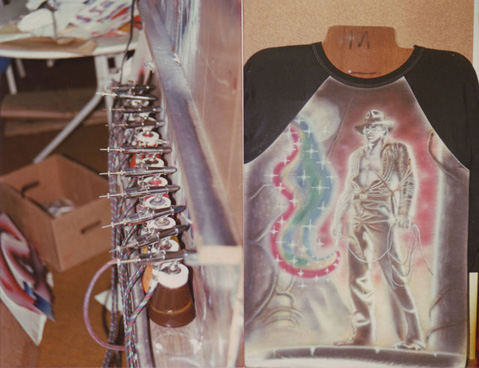
Above is a pic of my airbrushes (each one dedicated to a single color spray). They're resting in the tray of a super-wide easel I designed and built myself, which could hold 4 T-shirt panels at once in a pinch. Above is also a T-shirt with another version of Indiana Jones on it-- only with my face on it, and the figure holding a magical airbrush.
To right is shown quite a few of the designs customers could choose from my repertoire. Basically I'd add their names to whatever design they chose for their shirts.
|
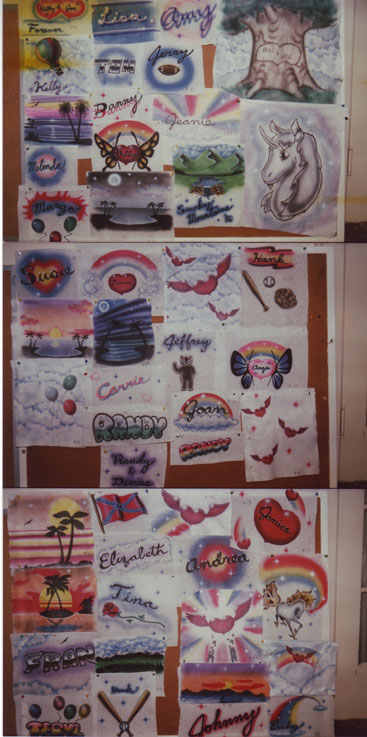
|

Above is a matching T-shirt/panty set.
|

Another set of matching sleepwear.
|
I later became a programmer. Sold some software. Did it again. A few years later I designed and built a good-sized LAN for an R&D corporation. Implemented corporate email before internet email really existed outside a few government agencies and college campuses. Basically became head of a corporate IT department (although I'm not sure anyone was using the term "IT" back then).
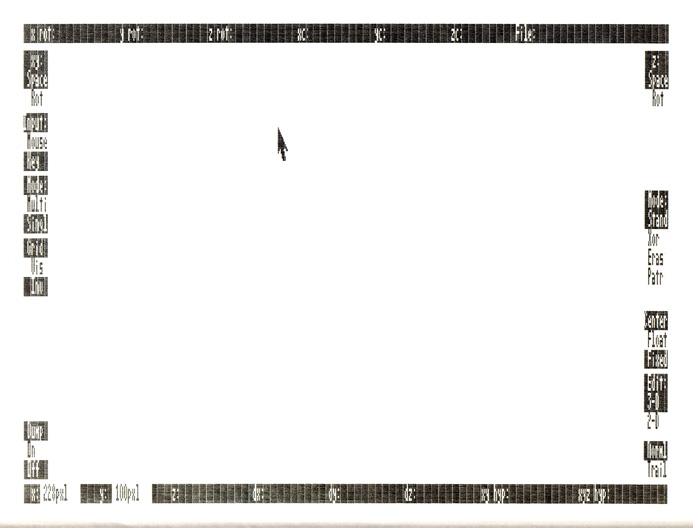
Above is what the main user interface screen to my first commercial application looked like. Just like a great many other programs of that time, the interface was basically text-based, with optional pull-down menus. The keyboard was still the main interface, with the mouse or trackball mostly used for free-hand drawing on-screen.
Below is a fantasy lady sketched in the program. Both these images are print outs from the original software.
|
|
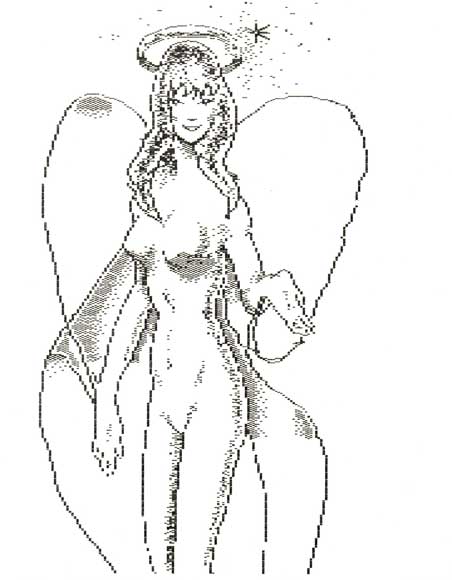
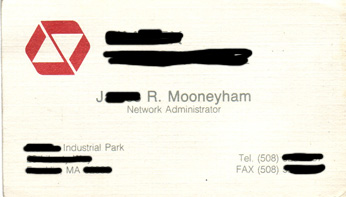
Above is a view of the business card the company had made for me. Some details are blacked out for privacy reasons.
To right is a map of the network I installed. Some of the rectangles are walled offices or conference rooms, some cubicles.
The black boxes represent spots a computer could be connected to the network.
|
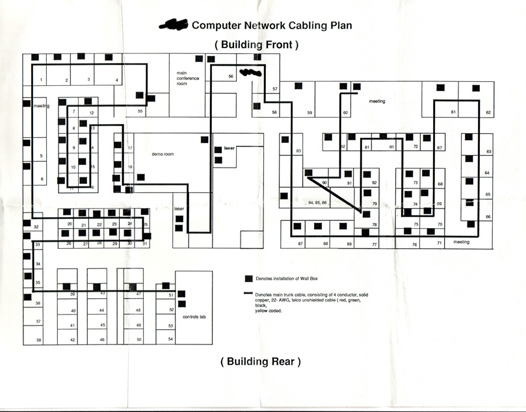
|
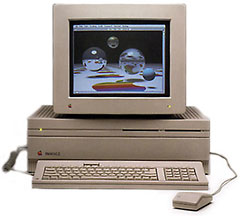
At my first major corporate stint I got to use a real dream machine: a brand spanking new Apple Macintosh IIx: the juiced-up version of the first Mac ever with a color display (the Mac II). I called him Goliath, due to his massive 8 MB of RAM and 100 MB hard disk. This was back in the days of Mac golden System 6.x, and life was good! Today's Mac OS X users would likely be astonished by how much smoother and easier things went with System 6.x than they do today with OS X. Those System 6.x Macs didn't have internet access of course (the net basically didn't exist back then for anyone but mainly rocket scientists) but for everything and anything else they couldn't be beat! Even today on Mac OS X and Windows XP machines I often miss the supreme ease-of-use and at times superior-to-today's computing powers exhibited by those ancient Mac System 6.x machines. In some ways it seems computers have gone backwards rather than forwards, since those days.
|
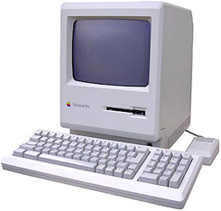
The vast majority of computers on my new LAN back then were Mac Pluses-- but we added newer Mac SEs as fast as we could. The engineers and executives and secretaries loved them-- especially since the main alternative back then was clunky Windows 3.x PCs (this was well before Windows95 made its debut).
|
I managed to get the attention of a vice president of Apple Computer with a new product idea. This led to some correspondence back and forth, an unexpected phone call or two(!), and a massive portfolio of further new product and service ideas I gave them in a pretty nice presentation format.
Unfortunately Apple seemed to do little with the concepts. During that time Apple appeared to do nothing more than tread water for a while, which led to a crash in their market share. A crash which seems to be continuing to this day (as they've never come near to regaining their historic peak in marketshare again; all things like iMacs, iPods, and iPhones have done is prevent the company from being squeezed out of the computer biz altogether).
At around the same time all the above had been going on, I'd also saved up some money, and spent an ungodly sum on new hardware and software to do a programming project with my brother. Our tiny startup was underfunded though and so our computer operating system rug was pulled out from under us by the time our product was ready to ship. Agh! We were too exhausted to try to pick up the pieces. We'd also faced the problem of being ahead of our time. For you know how today practically all software developers offer up restricted versions of their programs for you to try before you buy? Limited by either functionality or time of use? Where you can send them money and get an unlocking password? My brother and I were one of the pioneering teams with that I believe. But the concept was so new back then the main channels of distribution (online libraries and shareware distributors on floppy and CD) balked at carrying such stuff.
So between the distributor problem and the sudden OS change our little project withered on the vine. I'd personally spent thousands of dollars and untold manhours on it. Ack! But that's how entrepreneurial ventures on shoe-string budgets go (especially if they're innovative): there's lots of failures for each single win (unless you're extraordinarily lucky).
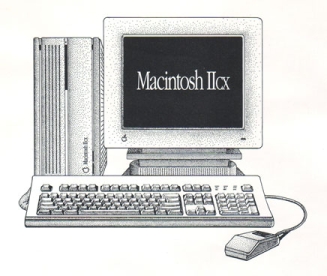
I'd become addicted to the power of the Mac IIx I'd used in my corporate stint. Plus needed comparable power for my next entrepreneurial venture. So I paid out thousands of dollars to obtain a couple of suitable systems for me and my brother to create a commercial application on. A smaller version of the IIx for me: a Mac IIcx with display, extra RAM and software, etc. Plus an SE and programming languages for my brother.
|
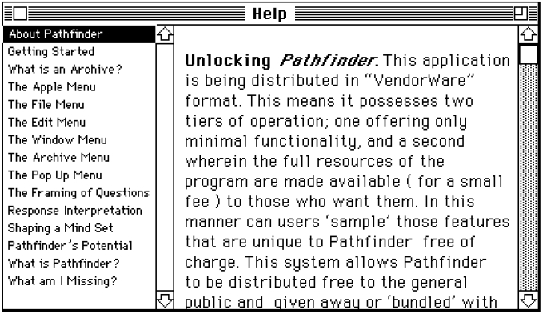
Above is Pathfinder v1.0's Help window, where can be seen the beginning of an explanation of the new 'demo' style arrangement we were pioneering.
|
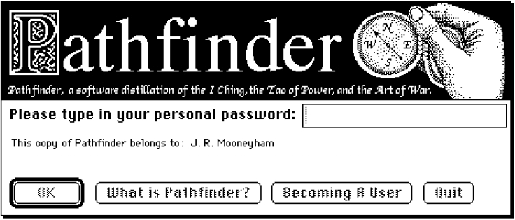
Above is the entry screen for Pathfinder v1.0. If you didn't have a personal password you could simply create one to enter the program.
|
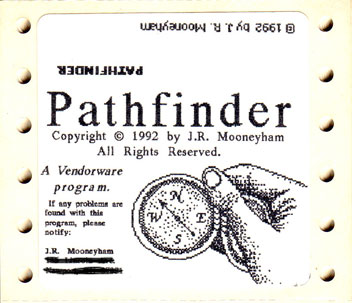
An old floppy disk label for Pathfinder software.
|
Pathfinder v1.0 had been written for the Apple Macintosh in the C language by my younger brother, to design specs laid out by me. Pathfinder answered user questions, about almost anything.
Pathfinder got its intelligence from the three classics of the I Ching, Tao of Power, and Art of War. I'd written my own integrated interpretation of those tomes, after many years of study and personal use.
In my own interpretation, I tried to make the principles espoused more easily applied to modern conditions than
the originals (which were written many centuries ago).
Anyone already familiar with how the traditional I Ching works can-- in the near future-- reference Pathfinder's original texts here (I'm in process of reformatting and posting them as of May 2008).
Besides writing all the text and creating all the artwork, I also undertook the challenge of giving Pathfinder a better way to assemble its responses than any possible competitor along these lines could. The results turned out so well the program sometimes gave me goose bumps when I used it. Sorry: but I'm not going to divulge how I did it (I still hope to make Pathfinder an online app someday).
So I designed the algorithms for Pathfinder's decision matrix, as well as wrote out its entire universe of possible responses. Plus came up with the system it used to switch from demo-ware to unlocked and back again, as appropriate in the wild. I also did virtually all the testing in development, and wrote up bug reports for my brother. As well as provided the funds to finance the whole venture in the first place.
On the side I became an expert in Apple's HyperCard. And created and published an interactive electronic magazine downloadable from America Online and elsewhere, plus on shareware CDs (The world wide web didn't yet exist). Some issues also included bundled with them all-new software I'd created. But once again I ended up having the software rug pulled out from under me, only in a different fashion. Agh!
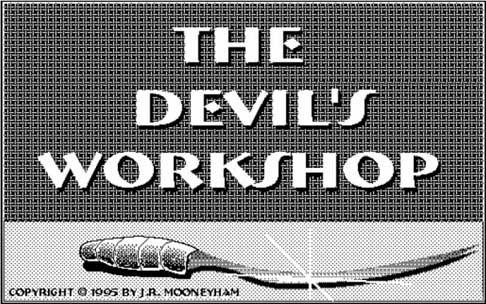
Above can be seen the opening screen for Devil's Workshop-- one of the 'extra' goodies which often came bundled with my electronic magazine issues. Devil's Workshop enabled you to hack just about any HyperCard stack, no matter how well protected it was.
Of course, the ultimate HyperCard hack was to set HyperCard scripting free of Apple again, after they began charging for the privilege.
|
|
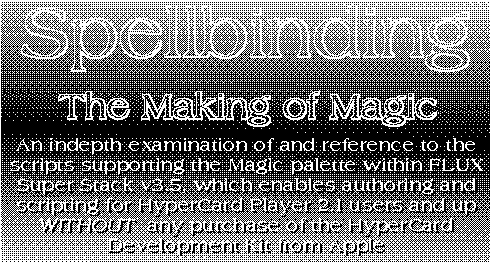
One of the last hurrahs for my own Hypercard development efforts was making HyperCard scripting free for everyone equipped with a HC Player. Any of my free HyperCard-based magazine issues (I also had some Adobe PDF versions) could be converted by the click of a button into a Super Stack, which allowed most of the functionality of a HyperCard development kit for free-- plus some unique extra functions like Comic-building tools too.
The very best version of that would be in my final issue.
Soon after that Apple killed HyperCard altogether. Oh no! Nooooooo....
As soon as I could coax a web browser to visit more than two sites in a row without crashing I got on the web. And helped lots of other folks to as well, by becoming my local ISP's only Mac tech support for thirteen Tennessee counties. Back then internet connections were extremely geeky. I assembled a kit of the software required and wrote and illustrated a comprehensive manual for the task. Also made house calls. Like many other geeks of that era, I simply 'knew' that the internet was something so fantastic it had to be supported and expanded in every practical way by everyone and anyone who knew how. So I configured folks' computers from scratch, and wired them up, and taught them how to use the web and email and maintain their connections-- until after a couple years or so I was exhausted, and Apple Computer had finally begun making Macs easier and quicker to get online out of the box (it sure did take them long enough! Macs seemed to badly lag behind Windows PCs on this matter for quite a while).
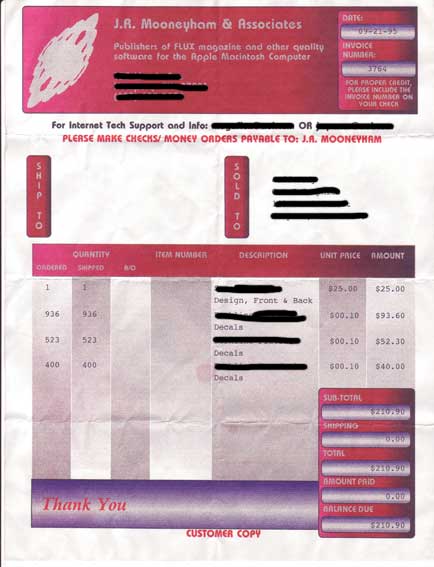
Above, a pic of my custom bills template from back then. I offered a fairly wide array of services. In my impoverished area of the country, it often helped encourage your customers to pay you on time if the bills you sent them looked impressive! Ha, ha.
|
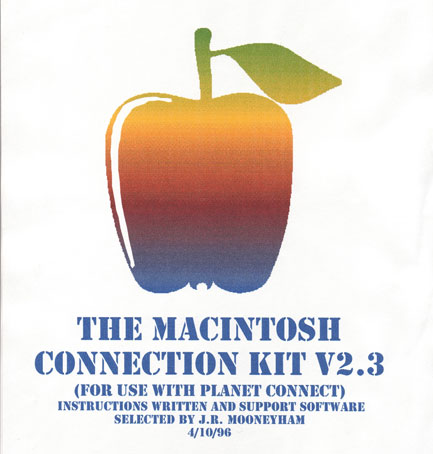
Above can be seen the cover of one iteration of my Mac Connection Kit.
|
I soon established my own web site. For a while I had my kit available online there, to help early internet adopters among Mac users everywhere get connected.
After personal computer quality and 'ease-of-use' peaked around 1990 with Mac System 6.x-- then plummeted industry-wide (for Macs, Windows, et al) in the years following-- I began documenting my own struggles to keep the ever worsening Frankenstein's monster combos of hardware and software running, in order to help others. This resulted in computer use logs for Microsoft WebTV, Apple Mac IIcx/IIci, Apple Mac Performa 460, Apple Mac Quadra 650, Compaq Presario 5151, Apple iMac Revision D (333 MHz), and Hewlett-Packard Pavilion XE783. Even up through the SOHO (Small Office Home Office) LAN, Compaq Presario S4020WM desktop, and Compaq Presario 2170 Laptop I'm using in early 2008.
Judging from my related reader emails over the years, the user logs have helped quite a few folks along the way.
I also write about larger matters relevant to internet authors and entrepreneurs, in pages like How small-time web sites can make it financially on the internet and Low cost web site authoring log.
Don't let my various expressions of annoyance and regret above mislead you: some of my ventures did OK. Or at least good enough for my purposes. I managed to avoid maybe 95% of the college debt my friends took on for school (I was astonished to learn a couple old college friends still owed money on those as late as mid-2001! Yikes!). I also managed to fund research and development related to various personal projects on the side-- of which Shadowfast was merely the first. And have more adventures too. Some of them, unfortunately, well earning the classification of "hell of an adventure".
I should also mention that I 'got by' this way entrepreneur-wise in the early days in a badly depressed region of the country at the time, with frequent unemployment rates of around 18% or higher I believe (heck, it might have gotten close to 25% a few times).
In my early experimental self-employment days I figured if I could make it somewhere like that, I could make it anywhere. For quite a while I was an all-around-handy-man, doing just about anything for a buck, from weeding gardens to doing tax returns to wiring automobiles to designing signposts for businesses.
a - j m o o n e y h a m . c o m - o r i g i n a l
Some geeks accidentally become heroes
It may well be impossible for most of us to intentionally become true heroes. For one thing, suitable situations with folks in distress don't tend to come about under the normal circumstances most reasonable people inhabit from day to day. So someone purposely looking to be a hero would likely have to seek out some bad neighborhoods or dangerous wilderness to start-- and so possibly die simply from foolishness before any acts of heroism could be carried out. I.e., get mugged themselves, or get lost or injured in some remote area or cave and die of blood loss or thirst.
On the other hand, such would-be heroes could also become firemen, emergency medical personnel, or join a rescue team to get to where such opportunities abound. But most of us don't want a career saving people: we want one or two feats we can brag about the rest of our lives. That's all. Preferably (among us menfolk) saving a particular damsel in distress. Any more than that we'd usually prefer to avoid.
Why? Basically because being a hero can be pretty darn hard and dangerous-- and curiously unrewarding in most cases. And the folks you'd most like to save never seem to need saving. Or if they do, it's not an 'instant breakfast' save you can do in minutes or hours like I'm talking here, but more of a long drawn out therapy sort of thing, like putting up with a ton of crap while they try to quit drinking or drugs, or something like that. Yech! Don't get me wrong though. From my own experience I now consider those folks who endure the long slog to help others over months and years like this to be at least the equivalent of the firemen, emergency medics, and rescue personnel in terms of heroism-- heck, maybe more so. Because going for months, years-- even decades!-- being a decent father, mother, friend, spouse, teacher, etc., etc., is in my mind much tougher than doing the hero thing for just a few minutes or hours at a time. Heck, given the proper circumstances practically anyone can be a sufficient hero to rate the evening news. But far fewer can fill the roles of those folks who truly keep civilization going.
Rescue personnel, etc., tend to perform their quickie heroics at the edges of civilization. Parents, teachers, nurses, etc., do their quiet works of heroism sometimes with virtually no break at all for years at a time, smack in the core of society itself. Sometimes confronting risks every bit as extreme as law enforcement or rescue personnel themselves-- but with no news reporters around to document it.
But getting back to the more seemingly dramatic yet less demanding hero roles-- it often turns out someone who appears to need saving doesn't want to be saved-- and will at minimum chastise you for the act, and at maximum make you deeply regret your actions on their behalf. Yikes!
Then there's the self-preservation factor (closely related to abject terror). Even where a suitable situation for heroics might appear, the opportunity may prove too scary to seize upon, or else our subconscious deems the potential victims
of insufficient value for us personally to maybe die for. Think about it: Giving up your life for a complete stranger today means you can't do it tomorrow for your kid. Who rates higher in your priorities? No matter how noble our intentions, such things can cause us to remain rooted to the spot in hesitation: and even a few seconds delay can close the window of opportunity.
Uncertainty too can prevent heroism. Even where the opportunity exists, you can overcome your own fright, and the victim is someone valuable enough for your subconscious not to stand in your way, you may not be able to figure out what to do. And again, the window of opportunity may not remain open long enough for you to succeed.
But many of us geeks are way too passionate for our own good, often acting before we think through the consequences. So fear and even subconscious restraints may not stop us. And though our smarts may be limited in some well-known ways (like social situations) they may often easily meet the challenge of uncertainty described above.
Add in any propensity for risk-taking at all, and you've definitely got most of the ingredients necessary for an accidental hero. All you need to add after that is the opportunity.
I learned all this first hand. Stepped into some situations it seemed I was needed, only to find rescue was unwanted. Seriously, folks. Some people want to die. It's as simple as that. And if you get in their way they might try to kill you for your trouble. Yikes!
But of course some people want to live. I accidentally saved a few of those along the way. Turns out in real life you and a buddy might find you've inadvertantly put yourselves at risk, and for various reasons you personally have a decent shot at escape but your friend doesn't. Not without your help. But rendering such aid may well result in you both dying. What do you do?
I'm proud to say I saved us both in my own test. Though it truly was a near thing. One of my own closest brushes with death ever.
Another time I managed to save someone much dearer to my heart even than that friend, in yet another close brush for me personally. But in that case I managed to save them without their ever knowing that I was there at all. Yes, this was something like my own Spielberg 'Back to the Future' film moment, only in real life. To this day I believe they remain unaware of my role in the event. Which is how I want it. There's simply no good reason I know of to tell them about it. I won't go into the details here, except to say both Shadowfast and I paid a heavy price for our actions that day (and no, this wasn't Shadow's last run; but it sure came close to becoming that).
That incident seems an exquisite example of real life accidental heroism to me. Heavy price paid, person saved (but completely unaware of what transpired from my vantage point), and maybe only two people in the world would ever know the whole story. So definitely no glory involved.
Both the above events occurred in my teen age years. But more accidental hero opportunities popped up after that. Some of them resemble aspects of the life of my 'Indiana Jones' friend, with whom I often joke that many of his true life stories would be unbelievable to lots of folks. I possess much fewer such tales than he, but I do have some. For one of the geekiest examples, I can point to the time I won a woman out of virtual slavery by winning a chess game. Yes, a chess game. At the time I expected to physically grapple with the guy in a reprise of my high school days-- but amazingly enough the bully liked to think of himself as an intellectual, and so we played for her freedom. True story. But terribly unbelievable.
Maybe that's another downside to a geek life: some of your best real life moments will simply sound too fantastic to be true.
Some geeks write books
So anyway, I've ended up with a first novel for whom the natural audience seems to be aging geeks like myself. Because there's way too much attention paid to how advanced technologies may work, and how they might impact civilization in future times. Heck, all you have to do is browse my massive background research for the book to see there must be vast geek overkill involved.
There's lots of programming-related references, and struggles where being a geek actually helps win the day.
The whole story is based on perhaps a mortal geek's ultimate programming ambition: write an artificial intelligence designed to survive through future ages and return to rescue its creator. No matter how long it takes for the technologies required to be invented.
There's some heavy duty geek fantasies realized in the story. As well as some sobering geek realities. Here the geek does get the girl. Two girls in fact. But plenty of regrets are generated along the way, with things definitely not turning out as expected. And yes, there is a shocker or two included. But what would a good science fiction book be without some paradigm-busting along the way? I'm sure some readers will have strong reactions to certain of the surprises in store. But hopefully anyone who's also read authors like David Brin, Robert Heinlein, or Larry Niven will be able to take the stunners without requiring immediate CPR.
CLICK HERE to begin the online novel The Chance of a Realtime.
Other noteworthy geeks:
| Coming Soon! |
|
Build a legend
|